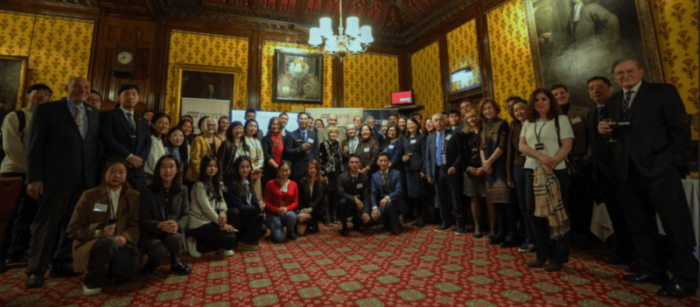
Global China Academy Celebrates a Decade of Excellence and Intellectual Exchange
The Global China Academy (GCA) proudly celebrated its 10th anniversary in conjunction with the conclusion of the 8th Global China Dialogue. This significant milestone was marked by a series of events held at prestigious venues, including the British Academy and UK Parliament, on December 8, 2023.
This year’s celebration was not just a reflection on the past decade’s achievements but also a forward-looking gathering that set the stage for future intellectual exchange and collaboration. The event brought together scholars, experts, and thought leaders from around the world, facilitating insightful discussions on global health governance and related themes.
Highlights of the Anniversary Celebrations:
- The evening commenced with a reception celebrating the launch of new websites for the Global China Academy and Global Century Press. This digital expansion represents GCA’s commitment to accessible and global knowledge dissemination.
- The dinner was a blend of celebration, recognition, and intellectual discourse. Notable speeches were delivered by key figures, including Professor Martin Albrow, Professor Tony McEnery and Professor Robin Cohen, reflecting on GCA’s journey and its pivotal role in fostering global dialogue and building global society.
- The event also recognized the contributions of various scholars to the field of China studies and global exchange. Certificates were awarded to GCA Fellows, Associate Fellows institutional Fellows, acknowledging their significant academic achievements and contributions.
- The celebration included virtual contributions from GCA Fellows and speakers who couldn’t attend in person, highlighting the Academy’s widespread influence and connections.
Over the past decade, the Global China Academy has established itself as a leading institution in promoting scholarly research and dialogue on China and its global interactions. Its conferences, publications, and academic collaborations have significantly contributed to the understanding of China’s role in the world.
As the Academy steps into its second decade, it continues to uphold its mission of fostering intellectual exchanges, promoting diverse perspectives, and contributing to global understanding and cooperation.
The ‘Photo Report’ below contains about 1,500 words and 70 photos, and includes links for viewing or downloading related speech notes and greeting texts or video transcriptions.
Photo report: Reception and Dinner to Celebrate the Conclusion of GCD8 and the GCA’s 10th Anniversary, 19:00-22:30, 8 December 2023 at the House of Lords, the UK Parliament
Reception: 19:00-19:30 Drinks and networking
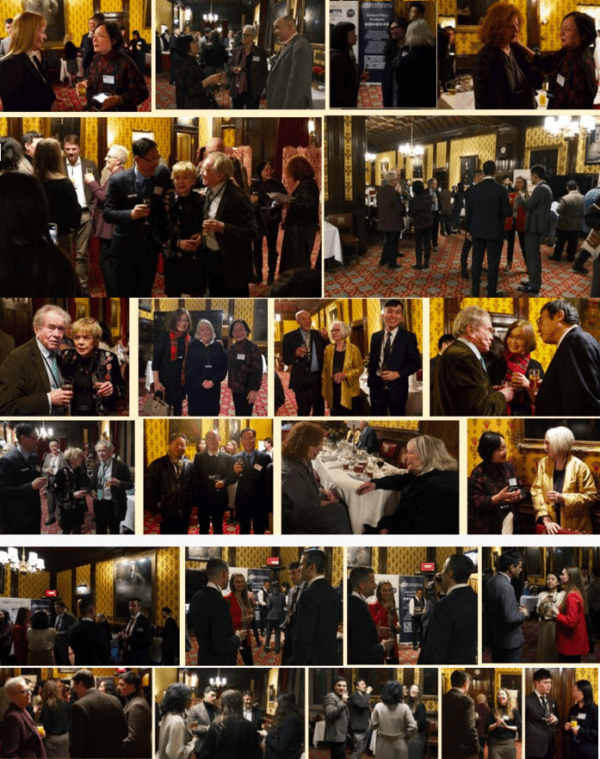
Reception: 19:30-19:50 Launch of two new websites for GCA and GCP
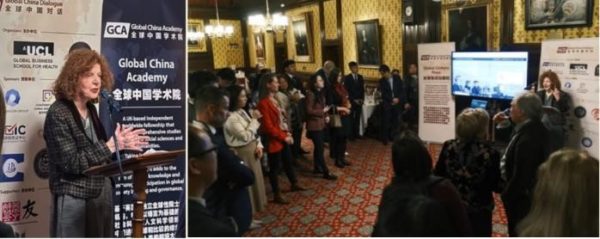
Chair: Professor Maria Jaschok 叶玛丽教授, Life Fellow of Global China Academy, Senior Research Associate of the Contemporary China Studies Programme in the Oxford School of Global and Area Studies, University of Oxford

Brief introduction to the two websites, by Professor Xiangqun Chang 常向群教授 FRSA FGCA and President of Global China Academy; Honorary Professor of University College London (2015-20); Distinguished Professor of Nankai University of China
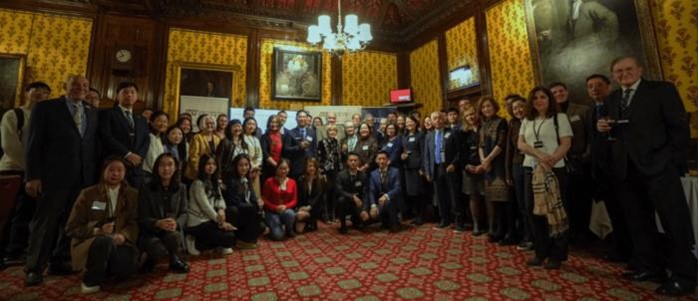
Participants at the launch of the new websites
Dinner: celebrating the conclusion of the 8th Global China Dialogue and the 10th Anniversary of Global China Academy
Dinner: 20:10-20:25 (after starter) Speeches
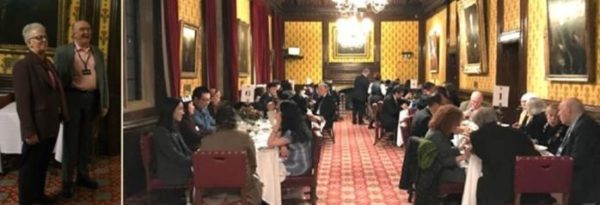
Chair: Professor Elena Semino 埃琳娜·塞米诺教授 FAcSS FRSA, GCD Organizing Committee member, Director of the ESRC Centre for Corpus Approaches to Social Science, Lancaster University (left in photo)
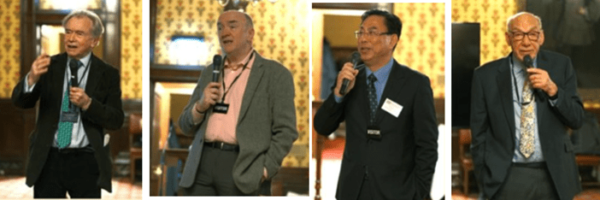
Speakers:
- Professor Martin Albrow 马丁阿尔布劳教授, FAcSS, Founding and Past Honorary President of Global China Academy; Former President of the British Sociological Association (left in photo). Click to download speech notes in dual languages.
- Professor Tony McEnery 托尼麦肯尼教授, FAcSS FRSA FGCA and Chair of Global China Academy Council, Council Member of the Academy of Social Sciences, Distinguished Professor of English Language and Linguistics at Lancaster University (second left in photo). Click to download speech notes in dual languages.
- Dr QIAN Zhenhua 钱振华博士, Co-Chair of Global China Academy Council; Shanghai International Corporation Association of SMEs, China (second right in photo). Click to download speech notes in dual languages.
- Professor Robin Cohen 罗宾科恩教授, Life Fellow of Global China Academy; Emeritus Professor and Former Director of the International Migration Institute, University of Oxford (right in photo). Click to download speech notes in dual languages.
Dinner: 21:15-21:25 (after main course) Presentation of certificates
Chair: Presentation of certificates, Professor Tony McEnery 托尼·麦肯尼教授 (right in photo)
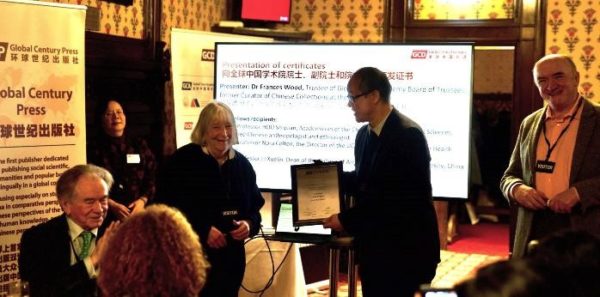
Presentation of certificates to GCA Individual Fellows
Presenter: Dr Frances Wood 吴芳思博士, Trustee of Global China Academy; former Curator of Chinese Collections at the British Library

GCA Fellows 院士 Recipients:
- Professor HOU Shiyuan 郝时远教授, Academician and former Associate President and former Director of the Institute of Ethnology and Anthropology at Chinese Academy of Social Sciences (absent, in China)
- Professor Nora Ann Colton 诺拉科尔顿教授, Director of the UCL Global Business School for Health (GBSH) (absent, in Manila)
- Professor LI Linxue 李麟学教授, Dean of the College of Arts and Media at Tongji University, China (left)
GCA Associate Fellows 准院士 Recipients:
- Professor QIAN Yufang 钱毓芳教授, Director of Institute of Corpus and Discourse Studies, School of Foreign Studies, Zhejiang Gongshang University, China; Editor of the Journal of Corpus Approaches to Chinese Social Sciences (centre)
- Dr Gavin Brookes 加文布鲁克斯博士, Reader in Linguistics and UKRI Future Leader Fellow with an interest in corpus linguistics, discourse analysis and health communication, Lancaster University, UK, Executive Editor of the Journal of Corpus Approaches to Chinese Social Sciences (right)
- Professor WANG Xin 王鑫教授, Head of Department of Communication, College of Arts and Media, Director of Research Centre for Chinese Discourse and Global Communication at Tongji University (absent, in China)
Presentation of certificates to GCA Institutional Fellows
Presenter: Professor Xiangqun Chang 常向群教授

GCA Institutional Fellows Recipients 院士单位:
- The UCL Global Business School for Health (GBSH), UK. Recipient: Professor Simcha Jong 辛查钟教授, GBSH representative (left)
- The ESRC Centre for Corpus Approaches to Social Science at Lancaster University, UK. Recipient: Professor Elena Semino 埃琳娜塞米诺教授, CASS representative (centre)
- The College of Arts and Media (CAM) at Tongji University, China. Recipient: Professor LI Linxue 李麟学教授, CAM representative (right)
Presentation of certificate to GCA Council member:
Presenter: Professor Tony McEnery 托尼·麦肯尼教授, Chair of Global China Academy Council

Recipient: Dr QIAN Zhenhua 钱振华博士, Co-Chair of Global China Academy Council
Dinner: 21:15-21:25 (after dessert) Greeting messages and videos
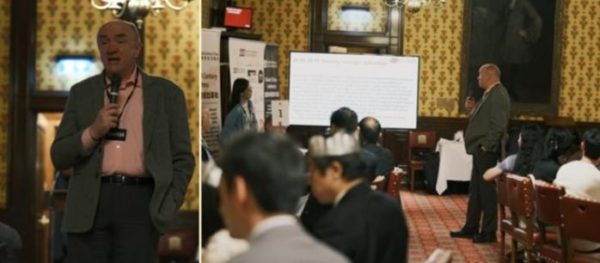
Chair: Professor Tony McEnery 托尼·麦肯尼教授, reading greeting messages and watching videos from absent GCA Fellows and GCD8 speakers (left)
Greeting messages were received from Professor KOMAI Hiroshi 駒井 洋教授 FGCA, a Japanese sociologist and Professor Emeritus at the University of Tsukuba and Shigakukan University, Japan; Professor Laurence Roulleau-Berger 罗兰教授, Life Fellow of Global China Academy, Emeritus Research Director at National Centre for Scientific Research (NCSR).
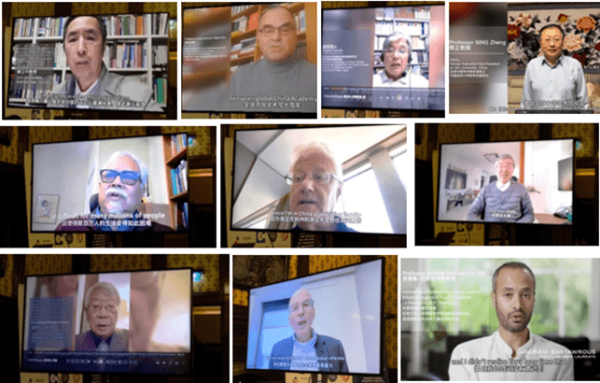
Videos with English and Chinese dual language subtitles:
Videos from absent GCA Fellows: Professor XIE Lizhong 谢立中教授, Founding Fellow and Chinese President of Global China Academy, Distinguished Chair Professor and former head of Department of Sociology of Peking University, China (top left); Professor Carsten Herrmann-Pillath 何梦笔教授, Founding Fellow and Vice-President of Global China Academy (European engagement), Permanent Fellow at the Max Weber Centre for Advanced Cultural and Social Studies, Erfurt University, Germany (top second left); Professor Shigeto Sonoda 園田茂人教授, Founding Fellow and Vice-President of Global China Academy (Asian engagement), Professor of Comparative Sociology and Asian Studies at the Institute for Advanced Studies on Asia, University of Tokyo, Japan (top second right); Professor BING Zheng 邴正教授, Life Fellow of Global China Academy, former Executive Vice-President of Jilin University, former Vice-President of the Chinese Sociological Association, China (top right); Professor Prasenjit Duara 杜赞奇教授, Life Fellow of Global China Academy, Distinguished Professor of East Asian Studies, Duke University, USA (centre left); Professor Peter van der Veer 彼得·范德维尔教授, Life Fellow of Global China Academy, Emeritus Professor and former Director of the Study of Religious Diversity at the Max Planck Institute, Germany (centre second left); Professor GU Yueguo 顾曰国教授, Life Fellow of Global China Academy, Emeritus Research Professor of Linguistics in the Chinese Academy of Social Sciences (CASS), Former Pro-Vice-Chancellor, Beijing Foreign Studies University, China (centre right); Professor HOU Shiyuan 郝时远教授, Fellow of Global China Academy (2023), Academician and former Associate President and former Director of the Institute of Ethnology and Anthropology at Chinese Academy of Social Sciences (bottom left)
Videos from absent invited speakers:
Professor Lawrence Gostin 劳伦斯·戈斯汀教授, Founding O’Neill Chair in Global Health Law, Georgetown University
Professor Andrew Bastawrous 安德鲁·巴斯塔罗斯教授 OBE, International Centre for Eye Health, London School of Hygiene & Tropical Medicine, Co-Founder & CEO – Peek Vision
Click here to view all the above texts or transcriptions.
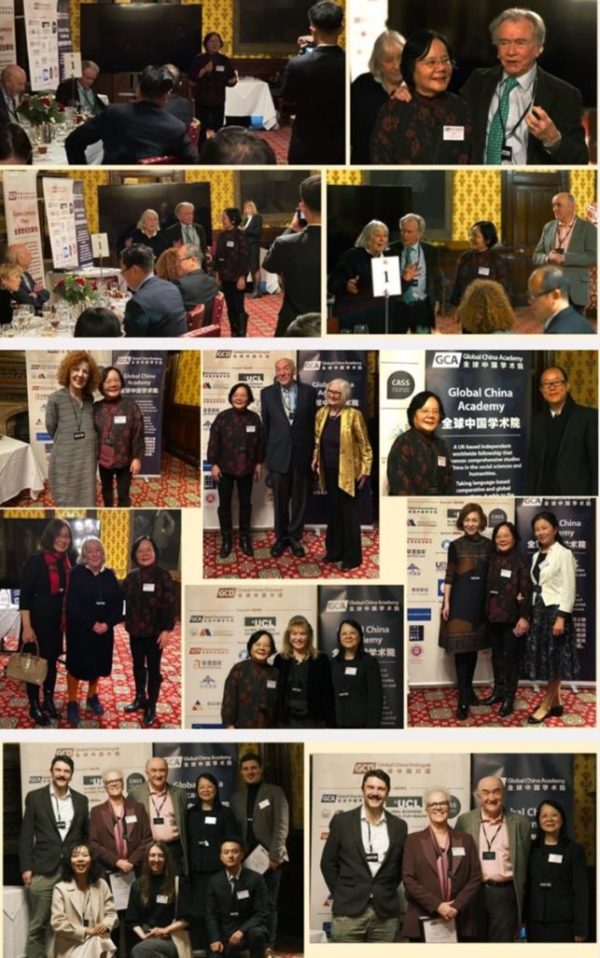
Afterwards, Professor Martin Albrow and Dr Frances Wood expressed their heartfelt appreciation to Professor Xiangqun Chang for her dedication and hard work in ensuring the success of the 8th Global China Dialogue and the 10th Anniversary of the Global China Academy. As the event came to a close, participants gathered in groups, exchanging warm greetings and farewells and taking photos to capture the occasion.
The Global China Dialogue Organising Committee is pleased to share feedback from a participant, which underscores the impactful nature of our events and the wide-reaching benefits they offer to attendees from diverse professional backgrounds.
‘I wish to send my most heartfelt thanks to Professor Chang for the wonderful and most successful event yesterday. Although my expertise is in family law and not the health sector, I feel I have benefited so much by attending the event, listening to all the talks and the research and insight from the various speakers. They were all fantastic and their hard work behind the research is outstanding and so much appreciated.
I especially would like to thank Professor Chang for inviting my friend Qing Miao and me to the dinner at the House of Lords. It was not planned by us, but we were both delighted and felt privileged to have been there. The presentation of the certificates and the various speakers sending their messages and greetings from the UK and abroad were extremely moving and uplifting. It was a real encouragement that the good work which has been started must continue and the gain will in time benefit us all.
I wish the GCA every success in all you do and once again thank you so much for the opportunity to be included in the attendance yesterday.’ — Brenda Wong Robinson, Associate at Buckles Solicitors LLP
More information is available on the GCD8 website: https://globalchinaacademy.org/global-china-dialogue-8.
- Click here to visit Photo Highlights: Global China Dialogue VIII (2023), New Website Launches for Global China Academy and Global Century Press, and 10th Anniversary of Global China Academy
- Click here to visit Photo highlights: Reception including Drinks and Networking, and Launch of Two New Websites for Global China Academy and Global Century Press.
- Click here to visit Photo Highlights: Dinner to Celebrate the Conclusion of the 8th Global China Dialogue and the 10th Anniversary of the Global China Academy (Part I), Including Speeches, Presentation of Certificates.
- Clich here to visit Photo Highlights: Dinner to Celebrate the Conclusion of the 8th Global China Dialogue and the 10th Anniversary of the Global China Academy (Part II) Including Reading Messages and Playimng Video Greetings, and Videos from Absent Speakers of GCD8.
- Click here to visit the GCD 8 website for more.
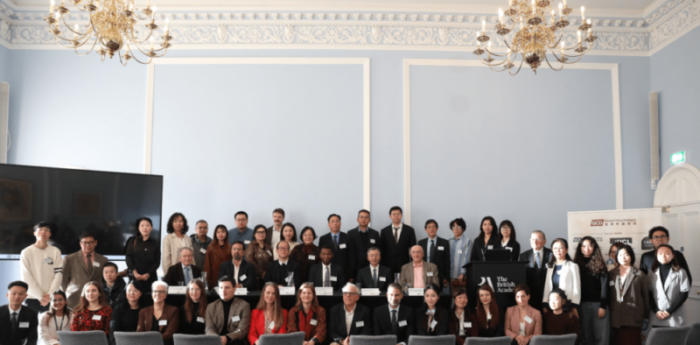
Exciting Updates from the 8th Global China Dialogue
The COVID-19 pandemic of 2020 revealed many weaknesses in our healthcare systems and structures across the world and showed that health is a challenge that requires global governance and cooperation. Other issues such as climate change, the global prevalence of noncommunicable diseases, inadequate access to healthcare services and the lack of health workers globally also show that the need for global cooperation to deal with transnational challenges has never been greater.
The 8th Global China Dialogue explored the challenges and opportunities for global health governance, especially in the Chinese context, given China’s ageing population, continued economic growth and desire to reimagine healthcare management and governance. The Healthy China 2030 strategy emphasizes the need to develop the health sector in China. China has also instituted significant regulatory reforms in the health sector, while considering healthcare in the new global governance framework.
The GCD8 was co-organized by the Global China Academy in collaboration with the UCL Global Business School for Health, the ESRC Centre for Corpus Approaches to Social Science at Lancaster University, UK, and the College of Arts and Media at Tongji University, China. It received support and sponsorship from numerous universities, institutions and companies.
The GCD8 and associated events, held on December 8, 2023, at the prestigious British Academy and UK Parliament, brought together scholars and experts from the UK, China, and France for an enlightening hybrid offline and online conference. Delving into the complexities of global health governance, the dialogue consisted of four insightful panels:
- Global Health and System Integration
- The Challenges of Global Health Governance
- Communicating to Improve Global Health
- Health Governance in the Digital Space
The ‘Photo Report’ below contains about 2,100 words and 130 photos, and includes links for viewing or downloading almost all the speech notes or PowerPoint presentations from the GCD8.
Photo report: The 8th Global China Dialogue — Governance for Global Health and the Global China Academy’s 10th Anniversary
Friday, 08:30-17:00, 8 December 2023 at the British Academy, followed by a Celebration Reception and Dinner at the House of Lords
Opening session
Greetings from political and academic figures
Chair: Professor Tony McEnery 托尼·麦肯尼教授 FAcSS FRSA FGCA and Chair of Global China Academy Council, Distinguished Professor of English Language and Linguistics at Lancaster University; Council Member, Academy of Social Sciences (right in panel)

Speakers (from left to right):

- Minister Wang Qi 王起of the Chinese Embassy to the UK said that the COVID-19 pandemic has had a significant impact on global public health and socio-economic development. Only by joining hands to build a global community of health for all can we effectively maintain and promote the safety and sustainable development of human life and health.
- Professor Ibrahim Abubakar 易卜拉欣阿布巴卡尔, Pro-Provost (Health) and Dean of Faculty of Population Health Sciences at UCL, emphasized the importance of interdisciplinary collaboration in addressing major global health challenges, such as the climate crisis, infectious diseases and health inequalities. He underscored the necessity of collaborative efforts, data-driven policies and equitable access to healthcare to improve health outcomes worldwide.
- Professor LI Linxue 李麟学, Dean of the College of Arts and Media and Distinguished Professor of the School of Architecture and Urban Planning at Tongji University, stated that the health sector is increasingly becoming a focal point of attention for the entire society. In the fields of urban planning and urban environmental design, healthy cities, communities and architecture, there is vast potential for development in emerging technologies such as big data, intelligence, simulation and green low-carbon construction.
- Professor Martin Albrow 马丁阿尔布劳, the Founding and Past Honorary President of the Global China Academy, provided some insights into the GCA’s history and announced the 10th anniversary of the Global China Academy, including a reception and celebration dinner.
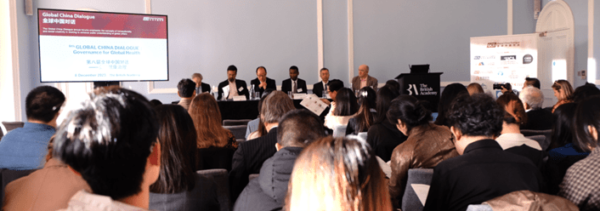
The photos below illustrate keynote speeches, panel discussions and closing remarks at the Global China Dialogue, as well as the Reception and Dinner. Additionally, there are images from the Q&A sessions and networking opportunities during breaks. It is hoped that this combination of images and text will promote dynamic dialogue for interested readers, regardless of whether or not they participated in GCD8.
Keynotes speeches
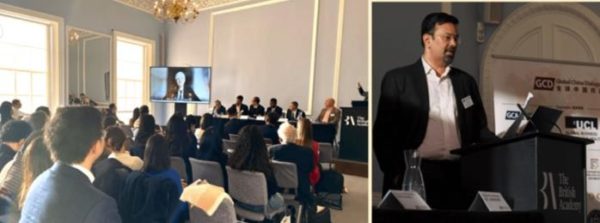
‘Global Governance and Health: Navigating the Complex Landscape’. Professor Nora Colton 诺拉·科尔顿教授视频, Director of UCL Global Business School for Health [online greeting]. Her presentation was delivered by Professor Colton’s colleague Professor Kabir Sheikh卡比尔·谢赫教授代读, UCL GBSH). Click to download the following items: greetings, speech notes and PowerPoint presentation.
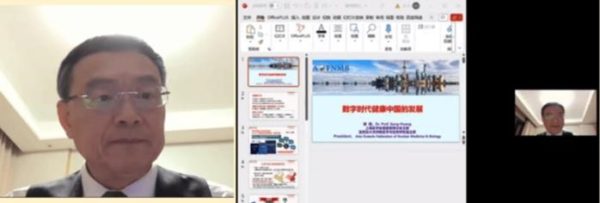
‘The Development of Healthy China in the Digital Era’, Professor HUANG Gang 黄钢教授, Founding President of Shanghai Health Medical College, Distinguished Chair Professor of Medical School of Shanghai Jiao Tong University, China [online]. Click to download the PowerPoint presentation in English and Chinese.

Group photo at the end of the Opening session.
Panel I: Global Health and System Integration
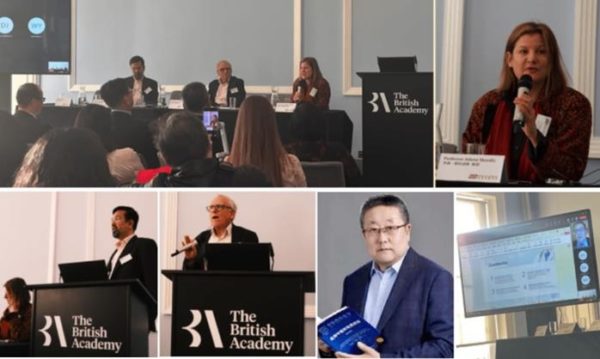
Chair: Professor Jolene Skordis 乔琳·斯科迪斯教授, Institute of Global Health, University College London
Plenary speakers (from left to right):
- ‘Mixed Health Systems in Asia and the Challenge of Governance’, Professor Kabir Sheikh 卡比尔谢赫教授, Global Business School for Health, former Policy Adviser for the World Health Organization (WHO). Click to download the PowerPoint presentation.
- ‘Interconnectedness and Competition in the Global Health System’, Professor Gerry Bloom 格里布鲁姆教授, Research Fellow and Co-Convenor of the Health and Nutrition Research Cluster, Institute of Development Studies, University of Sussex. Click to download the speech notes and PowerPoint presentation.
- ‘Integration and Innovation: The Logic and Practice of China’s Active Health Strategy in the Era of Population Ageing’, Professor HOU Shengtian 侯胜田教授, Professor of School of Management, Beijing University of Chinese Medicine; Director of the Health Industry Research Centre of the National Institute of Chinese Medicine Development and Strategy, China [online]. Click to download the PowerPoint presentation (in Chinese and English).
- ‘Integration and Cooperation: The Empirical Solution of Global Health Development’, Dr Peter Jeng 郑荣昌博士, CEO and Founder of China Britain Healthcare Consulting, UK; Deputy Secretary General of EU–China Commission, Belgium [online]. Click to download the PowerPoint presentation.
Panel II: The Challenges of Global Health Governance
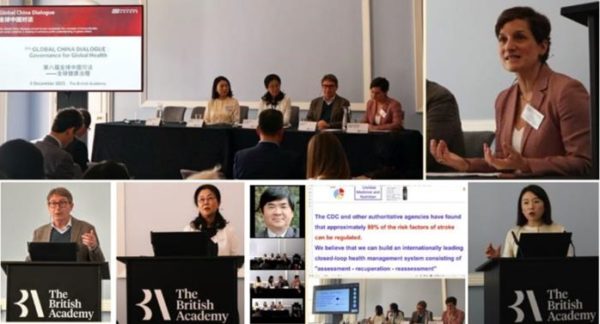
Chair: Ms Suzanne Wait 苏珊娜·维特女士, Managing Director of Health Policy Partnership and a Health Executive in Residence at GBSH, UCL
Plenary speakers (from left to right):
- ‘Building the Tools of Global Health Governance: The Case of Coronavirus’, Dr Joël Ruet 周瑞博士 , CNRS researcher at i3, Ecole Polytechnique; Senior Adviser Technology for Change and President of The Bridge Tank (G20 Think Tank Member), France
- ‘The Problems Faced by Medical Aesthetics: Challenges in Global Health Governance’, Dr LIAO Nong 廖农医师, Chief Physician of the Department of Plastic and Cosmetic Surgery at the Third Affiliated Hospital of Guangzhou Medical University, China. Click to download the PowerPoint presentation.
- ‘Challenge from an Ageing Society: The Urgency and Strategy of China’s Health Industry Development’, Professor YIN Weihai 殷卫海教授, Professor and Deputy Dean of the School of Biomedical Engineering at Shanghai Jiao Tong University, China [online] Click to download the PowerPoint presentation in English and Chinese.
- ‘Utilising Multi-disciplinary Research to Promote Global Health System Preparedness: Early Evidence from China’, Dr Yuxi Zhang 张予曦博士, Assistant Professor in Health Policy and Systems, Global Business School for Health, University College London, UK. Click to download the PowerPoint presentation.
Panel III: Communicating to Improve Global Health
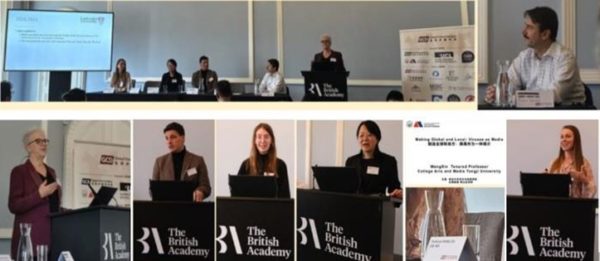
Chair: Professor Paul Baker 保罗·贝克教授, Department of Linguistics and English Language, Lancaster University
Plenary speakers (from left to right)
- ‘Understanding and Addressing Vaccine Hesitancy’, Professor Elena Semino 埃琳娜塞米诺教授 FAcSS FRSA, Director of the ESRC Centre for Corpus Approaches to Social Science, Lancaster University, UK. Click to download the PowerPoint presentation.
- ‘Public Communication about Dementia: Identifying and Challenging Stigma’, Dr Gavin Brookes 加文布鲁克斯博士, Reader in Linguistics and UKRI Future Leader Fellow with an interest in corpus linguistics, discourse analysis and health communication, Lancaster University; and Dr Emma Putland 艾玛·普特兰博士, Senior Research Associate, Lancaster University, UK. Click to download the PowerPoint presentation.
- ‘Evolution of Traditional Chinese Medicine Discourse in British Newspapers: A Corpus-Based Diachronic Study’, Professor QIAN Yufang 钱毓芳教授, Director of Institute of Corpus and Discourse Studies, School of Foreign Studies, Zhejiang Gongshang University, China. Click to download the PowerPoint presentation.
- ‘Making Global and Local: Viruses as a Media’, Professor WANG Xin 王鑫教授, Head of Department of Communication, College of Arts and Media, Tongji University, China [online]. Click to download the PowerPoint presentation.
- ‘Supporting Health Engagement and Co-creation’, Dr Marzena Nieroda 马泽纳涅罗达博士, Lecturer in Marketing and Commercialization for Healthcare at UCL Global Business School for Health (GBSH), University College London, UK. Click to download the PowerPoint presentation.
Panel IV: Health Governance in the Digital Space
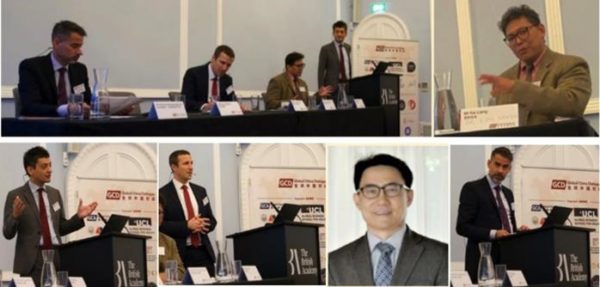
Chair: Dr Kim Yahya 金·叶海亚博士, a biomedical scientist who has worked in a variety of settings from academia to biotech companies in the UK
Plenary speakers (from left to right)
- ‘Capitalising on the Health Data Gold Mine: Using Federated Learning to Engage China in the Global Health Data Space’, Professor Simcha Jong 辛查钟教授, Professor of Management and Healthcare Innovation, Director DBA Health programme, UCL Global Business School for Health, UK. Click to download the PowerPoint presentation.
- ‘The Evolution of Health Governance in the Digital Health Space’, Professor Adam Dubis 亚当杜比斯教授, Deputy Director of Research and Programme Lead for MSc Digital Health and Entrepreneurship at UCL’s Global Business School for Health, University College London, UK. Click to download the PowerPoint presentation.
- ‘Hainan Free Trade Port: Challenges and Opportunities for Health’, by Professor NING Yi 宁毅教授, Professor and Dean of School of Public Health, Hainan Medical University, China [online]. Click to download the PowerPoint presentation.
- ‘A New Culture of Governance for an Inclusive Digital Future’, Dr Dimitrios Kalogeropoulos 迪米特里奥斯卡洛格罗普洛斯博士, Health Executive in Residence at GBSH, UCL, and CEO of Global Health and Digital Innovation Foundation, UK. Click to download the speech notes and PowerPoint presentation.
Closing session

Chair: Professor Xiangqun Chang 常向群教授, FRSA FGCA and President of Global China Academy; Honorary Professor of University College London (2015-20); Distinguished Professor of Nankai University of China; UK (right)

Closing remarks:
- ‘An Off-the-Cuff Summary of the Dialogue’s Main Themes’, Professor Tony McEnery 托尼麦肯尼教授, FAcSS FRSA FGCA and Chair of Global China Academy Council; Council Member of Academy of Social Sciences; Distinguished Professor of English Language and Linguistics at Lancaster University. He highlighted the interdisciplinary and engaging discussions that had occurred throughout the day, touching on various aspects of health, governance, trust and the role of traditional and modern medicine. The Dialogue emphasized the importance of listening, valuing diverse perspectives and the enriching nature of such exchanges. It also hinted at future discussions on AI and ethics, emphasizing the critical intersection of healthcare, decision-making and ethical considerations in the deployment of AI technologies. The day was summarized as insightful, stimulating a broadened perspective on health and governance, underscored by the foundational role of trust in scientific and medical expertise.
- ‘Upholding the Spirit of Open Cooperation, Building a Healthy Global Society for Mankind’, Mr FAN Daqi 范大祺副院长, Deputy Director and Chief Translator/Editor of the Academy of Contemporary China and World (ACCWS), China [pre-recorded video]. Fan Daqi’s closing speech was delivered in Chinese. He focused on the imperative of open cooperation and building a global health community. He discussed the impact of the pandemic, the importance of addressing global health governance and the need for dialogue and cooperation beyond geographical and systemic differences. Fan emphasized the role of think tanks, universities and research institutions in knowledge sharing and collaborative research to enhance global health governance. He advocated for a common health community, emphasizing sovereign equality, equity and the consideration of vulnerable groups’ rights and well-being. Fan also highlighted China’s contributions to global health governance and called for increased international cooperation to build a community with a shared future for mankind. Click to download the speech notes in Chinese and English.
Q & A sessions
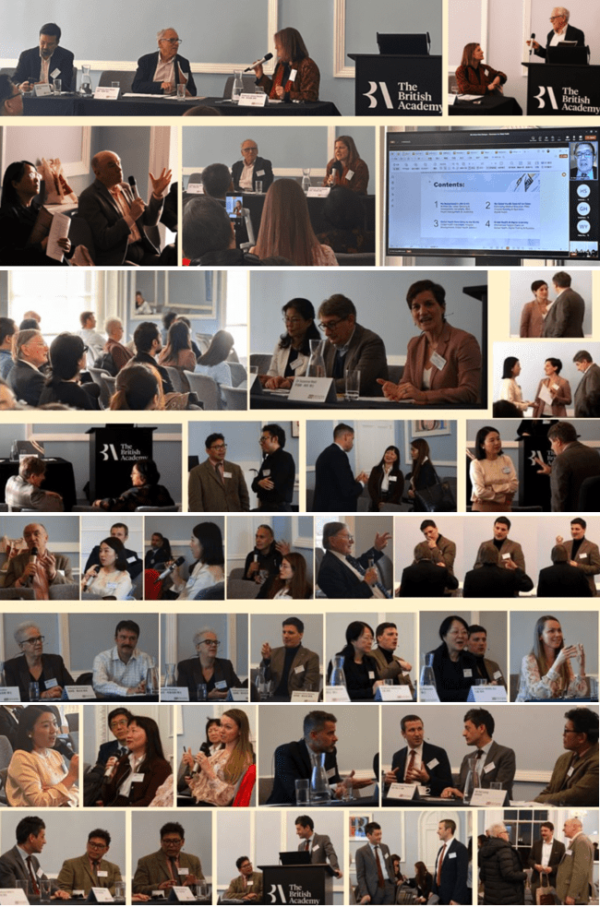
Networking during registration, tea/coffee breaks and lunch
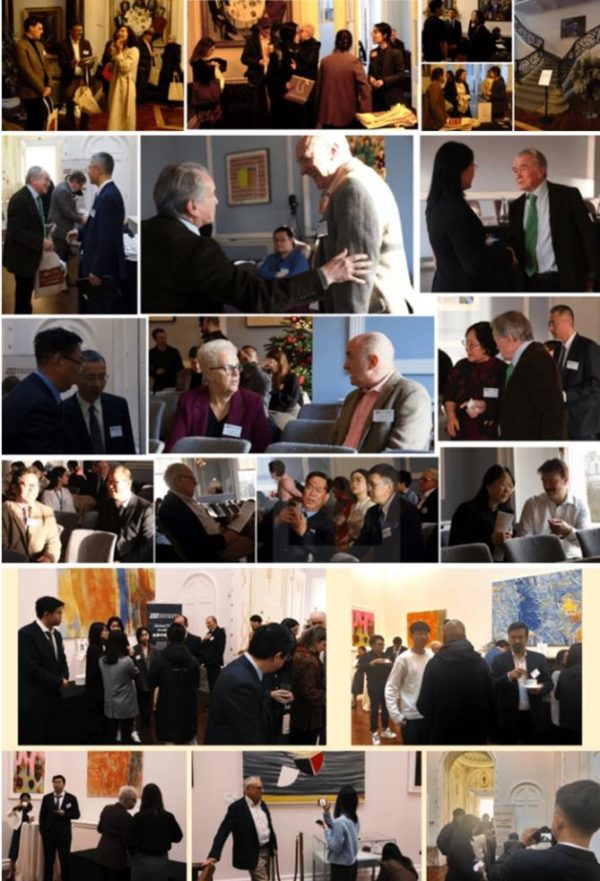
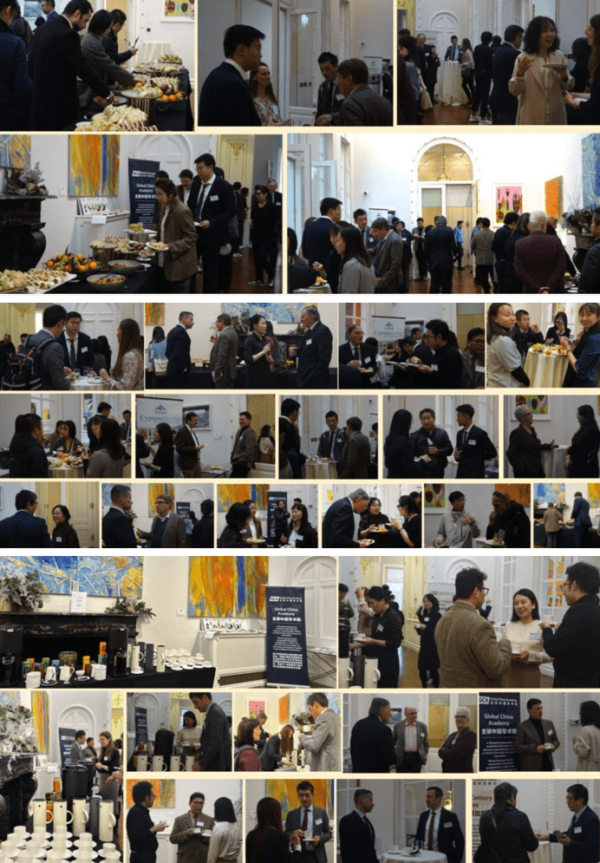
That evening, a Reception and Dinner were hosted at the House of Lords in the UK Parliament. Click here to view and download the related speech notes.
We have a large collection of photos from the 8th Global China Dialogue (GCD 8), and we’ve selected essential shots for publication on our photo report webpage. We encourage readers to explore the site to view many more photos that capture the essence of the event. This photo review showcases participants and highlights from the opening session, panel discussions, and networking breaks. It also includes the reception that marked the launch of new websites for the Global China Academy and the Global Century Press. Additionally, featured is the dinner celebrating the conclusion of the 8th Global China Dialogue and the 10th anniversary of the Global China Academy.
We are excited to share the profound insights and discussions presented by our esteemed speakers. Their expertise and contributions made this dialogue a landmark event in advancing the discourse on global health governance.
We extend our heartfelt thanks to all the organisers, supporters, sponsors, chairs, speakers, participants and volunteers who made this event a grand success. Your active engagement and insightful contributions are invaluable to the ongoing conversation on global health.
Don’t miss out on the enriching content from the 8th Global China Dialogue. Visit the GCD 8 website now to explore the photo reviews, speeches, presentations, and more!
- Click here to visit Photo Highlights: Global China Dialogue VIII (2023), New Website Launches for Global China Academy and Global Century Press, and 10th Anniversary of Global China Academy.
- Click here to visit Photo Highlights: Registration and Opening Session, including Greetings, Special Address, Keynote Speeches, and Announcement of Events Relating to GCA’s 10th Anniversary.
- Click here to visit Photo highlights: Panel I — Global Health and System Integration.
- Click here to visit Photo highlights: Panel II — The Challenges of Global Health Governance.
- Click here to visit Photo highlights: Panel III — Communicating to Improve Global Health.
- Click here to visit Photo highlights: Panel IV — Health Governance in the Digital Space and Closing Session.
- Clich here to visit the GCD 8 Website.
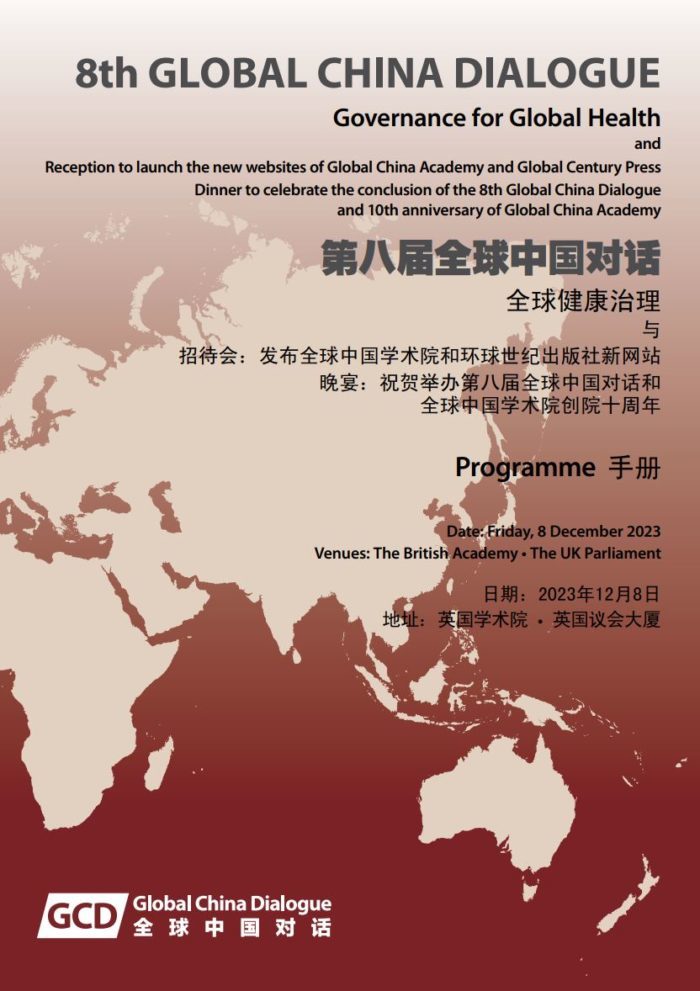
The 8th Global China Dialogue: Governance for Global Health
The 8th Global China Dialogue (GCD VIII)
Governance for Global Health
8:30-17:00, Friday, 8th December 2023, The British Academy &
19:00-22:30 Celebration Dinner for the 10th Anniversary of Global China Academy and
the GCD (VIII), Peers Dining Room, The UK Parliament
Click here for the GCD VIII page
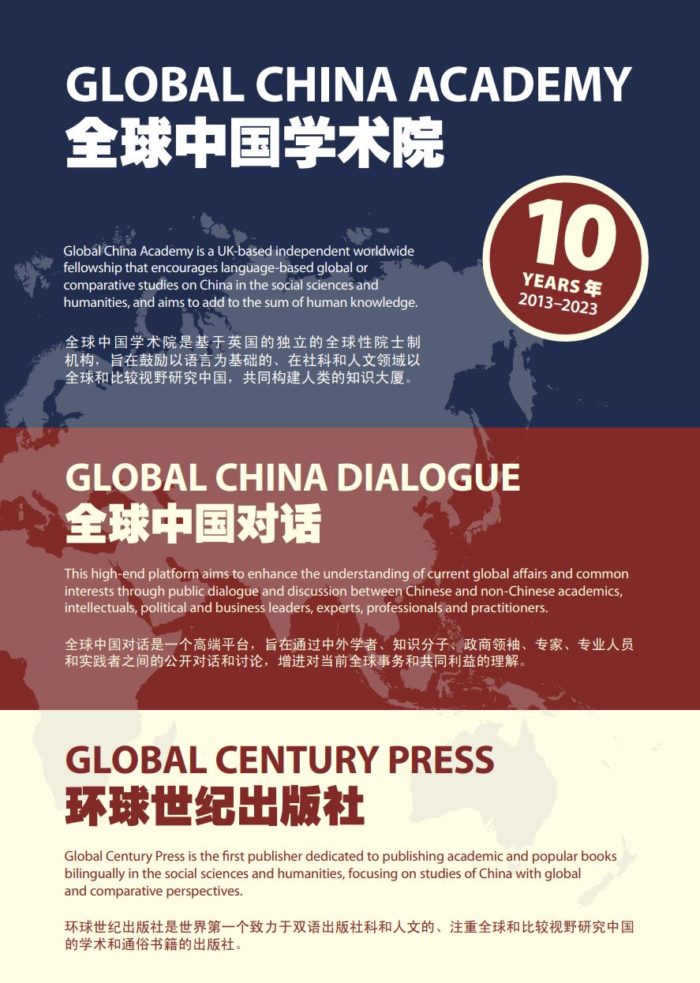
10th Anniversary of Global China Academy (CCPN Global, 2013-2023)
To celebrate ten years since the founding of Global China Academy (formally CCPN Global and Global China Institute, 2013–2023), we have produced a brochure. It includes information about:
- Global China Academy
- the GCA Fellowship
- the Global China Dialogues
- Global Century Press
Global China Academy: An Introduction

About Global China academy
Global China Academy (GCA) is a UK-based independent worldwide fellowship that encourages comprehensive studies on China in the social sciences and humanities. Taking language-based global or comparative perspectives, it aims to add to the sum of human knowledge. It also encourages participation in global society building and governance. All of this is achieved through the dissemination of academic research, knowledge transfer, social consultancy and public engagement.
- Our publishing subsidiary, Global Century Press (GCP, UK Company No.: 08892970) is the only independent platform in the world dedicated to publishing uncensored work on China.
- Global China Dialogue (GCD) series forum is a high-end discourse platform facilitating communication between the Chinese and the rest of the world.
Board of Trustees
GCA was formerly known as CCPN Global, founded in 2013 (Charity No. 1154640), and Global China Institute. As a UK Charitable Incorporated Organisation (CIO, Charity No. 1198983), GCA is governed by a Board of Trustees, who are responsible for running the organisation in accordance with charity law, and for making risk assessments and taking the lead in implementing appropriate action if any risk should occur. Chair: Ingrid Cranfield. Founding and Past Hon. President (2013–2021): Martin Albrow FAcSS.
GCA Council
The GCA Council is composed of prominent individuals who have a keen interest in the study of China and the Chinese in a global context. The Council plays a vital role, advising and guiding the next phase of the Academy’s development and beyond. It is active in a range of other ways, including the recruitment of new Fellows, contribution of articles to our journals, recommendation and submission of books for publication by Global Century Press, recommendation of themes and speakers for our Global China Dialogues, and in raising the Academy’s profile around the world.
- Council Chair Prof Tony McEnery FAcSS FRSA FGCA, Lancaster University, UK
- Chinese Council Chair: Prof LI Qiang FGCA, Tsinghua University, China
- Non-Executive Chair, Prof LI Wei FBA FAcSS FRSA FGCA, IOE of University College London, UK
- Chinese Non-Executive Chair, Prof ZHANG Xiaodong FGCA, CEO of Agile Think Tank and Nanjing University of Finance & Economics, China
- President: Prof Xiangqun Chang FRSA FGCA, Global China Academy, UK
- Chinese President: Prof XIE Lizhong FGCA, Peking Uinversity, China
- Vice-President (Fellowship), Prof Peter Schröder, University College London, UK
- Vice-President (Publications), Prof Julia C Strauss, SOAS, University of London, UK
- Vice-President (Asian engagement), Prof Shigeto Sonoda, University of Tokyo, Japan
- Vice-President (European engagement), Prof Carsten Herrmann-Pillath, Erfurt University, Germany
- Honorary Secretary: Ms Ingrid Cranfield, Global China Academy and Global Century Press, UK
- Treasurer: Dr Thomas Clarke, Imperial College London, UK
- Member (Events): Dr Boyi Li, The London School of Economics and Political Science, UK
- Member (Publications): Dr Qing Cao, Durham University, UK
- Member (Media): Dr Yan Wu, Swansea University, UK
Global China Academy Fellowship

Types of fellowship
- Founding Fellows and Life Fellows were granted by Global China Academy’s founding Honorary Presidents (UK and China), Presidents (UK and China), and the Board of Trustees at the founding of the Global China Academy in 2021.
- Full Fellows are distinguished scholars, academics and professionals whose expertise and knowledge provide GCA with access to the best possible advice and guidance. They also contribute to the publications of Global Century Press and the Global China Dialogue series of forums.
- Associate Fellows are typically early to mid-career scholars, academics and professionals who have demonstrated potential in their field but may not yet have the extensive accomplishments or tenure of a Full Fellow. They often collaborate on research projects, contribute to publications and may participate in dialogues or forums.
- Institutional Fellows are organizations that share our academic and social missions and support the work of Global China Academy, Global Century Press and the Global China Dialogue series forums.
Eligibility criteria
Full Fellowship
- Has made a significant contribution to advancing the understanding or promotion of studies on China and the Chinese with global or comparative perspectives in the social sciences and humanities.
- Has an established track record of participating in transcultural initiatives, fostering dialogue and engaging with the governance of global society.
- Has shown leadership, innovation and influence in the above-named fields.
- Has clearly demonstrated ethical and moral integrity that aligns with the values of the GCA.
Associate Fellowship
- Aged 21 or over, and based in the UK or overseas.
- Has demonstrated an interest in the understanding or promotion of studies on China and the Chinese with global or comparative perspectives in the social sciences and humanities through research, teaching, training, professional work, publications or other similar work.
- Has demonstrated potential in their field, although they may not yet have attained extensive accomplishments and hence are not ready for Full Fellowship.
Institutional Fellowship
- The institution shares Global China Academy’s academic and social missions.
- The institution supports the work of Global China Academy, Global Century Press and the Global China Dialogues.
How to Apply
Before submitting a proposal please download the following information from the webpage https://globalchinaacademy.org/fellow-ship-nominations:
- Guidance for Nomination
- Nomination form
- Diversity Monitoring form
More Information
Please visit www.globalchinaacademy.org/gca-fellowship for more information:
- Fellowship Lists
- Fellowship Benefits and Obligations
- Fellowship Subscriptions
- Support us
Global China Dialogue and Other events
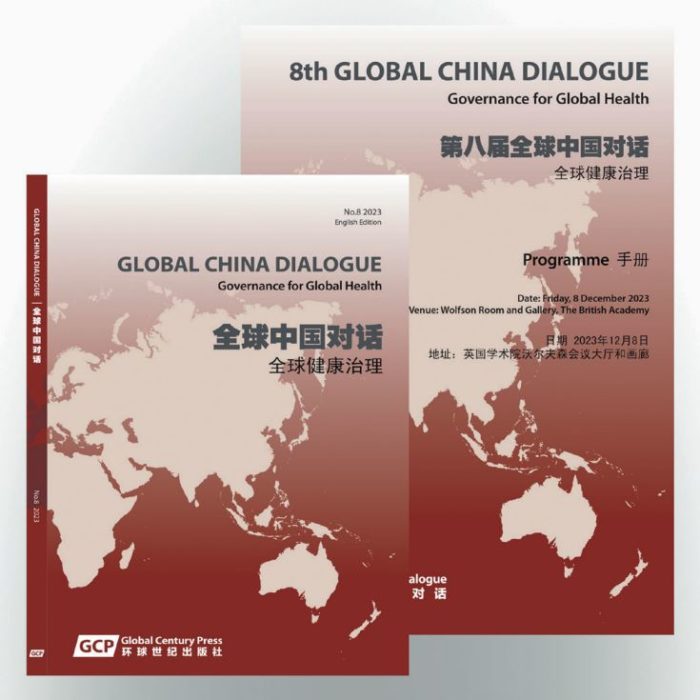
About the Global China dialogues
The annual Global China Dialogue (GCD) forum is a core event held by Global China Academy in collaboration with various organisations. The GCD is a high-end forum that focuses on ‘transculturality’ and social creativity. Our aim is to enhance public understanding of current global affairs and common interests. We do this via public dialogue and discussion between Chinese and non-Chinese academics, political and business leaders, experts, professionals, practitioners and interested laypeople. Our approach is interdisciplinary and comparative.
Based on GCDs rules of ‘civilized dialogue’, we encourage both sides to listen to the other, understand cultural differences, respect local customs, accept different perspectives and acknowledge the common humanity. In particular, it explores new global governance, encompassing national governments, international organizations, multinational companies, NGOs and citizens, with a mission to build a harmonious, symbiosis-based human community of a shared future.
Past and future dialogues as are follows:
- 2025 GCD X: Governance for Global Education
- 2024 GCD IX: Global Governance for AI
- 2023 GCD VIII: Governance for Global Health
- 2021 GCD VII: Reforming Global Governance
- 2019 GCD VI: Governance for World Peace
- 2018 GCD V: Governance for Global Justice
- 2017 GCD IV: The Belt and Road (B&R) – Transcultural Cooperation for Shared Goals
- 2016 GCD III: Sustainability and Global Governance for Climate Change
- 2015 GCD II: Transculturality and New Global Governance
- 2014 GCD I: The Experience of China’s Modernization from a Comparative Perspective
Other events

Global China Academy organizes and participates in activities relating to China in comparative perspective and social sciences and humanities studies on China, and in activities of a different nature that chime with its academic and social missions.
- 2019 Global China Media Seminar series (2016–19, UK)
- 2018 Academic Publishing and Knowledge Service Conference
- 2018 Digital Interconnection and Intelligent Manufacturing: Social Change and Cultural Transformation in Global Society
- 2017 Chinese for Social Science (CSS) Workshop
- 2017 Globalization of Chinese Social Sciences Symposium
- 2017 Global China Media in Comparative Perspective Symposium
- 2017 Forum Series on Transcultural Cooperation and New Methodologies for Social Sciences
- 2016 Corpus Approaches to Chinese Social Science (CACSS) Workshop
- 2014 A symposium on China-British Cultural Exchange: Strategic Cooperation and Practical Implementation
- 2013 Max Weber and China conference
- 2013 How do Migrants from the BRICS Countries Participate in Shaping the Global Society?
Global Century Press
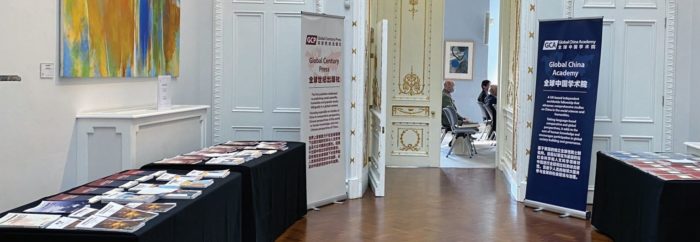
About Global Century Press
Global Century Press (GCP, formerly Global China Press, UK Company No.: 08892970), founded in 2014, is the first publisher in the world dedicated to publishing social scientific and humanities academic and popular books bilingually. GCP is the only independent platform for uncensored work on China, focusing on studies of China in global and comparative perspectives, Chinese perspectives of the world or human knowledge, and non-Chinese perspectives of China in a global context.
GCP publishes a range of publications, from academic journals, edit ed volumes, selected conference papers and theme-based articles, to research monographs, book series, teaching and learning materials on Chinese for social sciences and reference books, printed mostly in colour. Works are published in various forms, such as print, electronic versions, video, audio, on the internet and the mobile internet. A subsidiary company of the Global China Academy, GCP’s bilingual publications serve the purposes of disseminating related academic research, knowledge transfer and public education globally.
Open access journals and books
Under its open access model, GCP makes 80 percent of its journal and book content freely available to the public, promoting academic exchange and knowledge sharing. This means that readers can freely access and download certain articles or portions of the journal’s content, without any payment or subscription required. At the same time, GCP also offers a subscription model, providing readers who need it with wider access and services. Through subscription, readers can gain access to the full content of the journal, special features or additional resources, as well as other benefits exclusive to subscribers.
House Style Guide
CP House Style Guide can be downloaded in our website. It is designed to take our contributors’ work from initial manuscript to final publication with a minimum of fuss. Our style broadly follows APA 7th edition but has evolved over time through our growing experience of dual language editing and typesetting.
Dual languages
GCP is pioneering a unique approach to integrating English and Chinese in its publications. Its dual language styles and rules have been developed with both English and Chinese academics, graphic designers, editors and proofreaders. GCP applies this house style to all journals and books. GCP has DOI authorization. Any single article with a DOI number. Additional dual language information is displayed at the end of each book, a feature unique to GCP. Additional dual language information is displayed at the end of each book, a feature unique to GCP.
Publication events
Please visit GCP website for publication-related events: https://globalcenturypress.com/events.
Journals
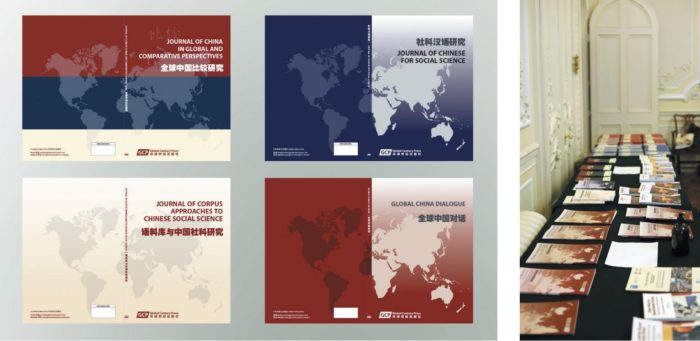
Global Century Press (GCP) publishes three cutting edge academic journals. They are Journal of China in Global and Comparative Perspectives (English and Chinese editions), Journal of Chinese for Social Science (Chinese edition), and Journal of Corpus Approaches to Chinese Social Science (Chinese and English editions). GCP also publishes the ‘Global China Dialogue Proceeding’ series in English and Chinese editions.
- Journal of China in Global and Comparative Perspectives (JCGCP). CGCP launched in 2015 (annually), publishes original multidisciplinary and interdisciplinary comparative research on China on a range of topics in the social and human sciences. Beyond purely academic content it appeals to policymakers and general readers interested in China. Its aim is to bring out the best in scholarship, transcending traditional academic boundaries in an innovative manner.
- Journal of Chinese for social science (JCSS). JCSS formally launched in 2021 (biennially), Formally launched in 2021, JCSS scrutinizes the utilization of the Chinese language in academic contexts, emphasizing the crucial role of precise translation and the issues arising from cross-lingual research in Chinese social sciences. It minimizes risks related to translation in cross-cultural research, and enhances dialogue among various languages, cultures, and communities. JCSS’s commitment to accurate translation forms the backbone of effective intercultural communication, ensuring contextual clarity and contributing to the global exchange of social science knowledge and ideas.
- Journal of Corpus Approaches to Chinese Social Sciences (JCAC SS) launched in 2019 (annually in Chinese and English alternatively), is guided by the founding Director of the ESRC Centre for Corpus Approaches to Social Sciences at Lancaster University, Professor Tony McEnery, and supported by colleagues both domestically and abroad. It introduces innovative corpus methods to the Chinese social sciences field. It addresses challenges in this domain, offers a platform for academic exchange, and publishes pertinent research in the context of big data and the complexities of the global digital age.
- Global China dialogue Proceedings. The Global China Dialogue forums aim to enhance the understanding of current global affairs and common interests through public dialogue and discussion, using interdisciplinary and comparative perspectives. Each issue of the Global China Dialogue Proceedings includes information on the chairs and speakers, topics and abstracts, and content of speeches and Q&A sessions. It also includes photos of the panels, participants, discussions, and networking. It is hoped that this combination of images and text can preserve the dynamic dialogue for interested readers whether or not they participated in the forums.
Book sciences
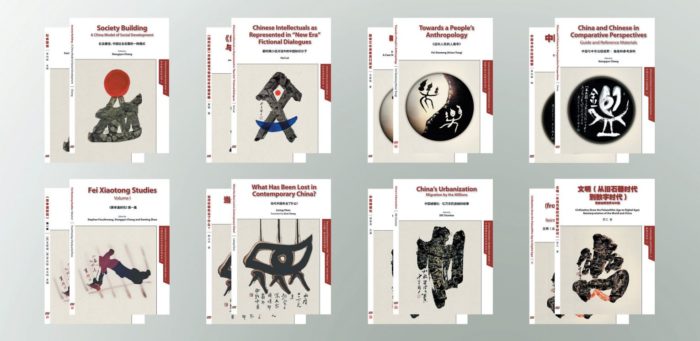
GCP publishes eight book series on specific themes. They are: and stimulates genuine global dialogue between cultures.
- Chinese Concepts aims to infuse Western social science concepts with uniquely Chinese elements. By revisiting terms such as ‘bao’ (reciprocation), ‘mianzi’ (face), and ‘guanxi’ (reciprocity or deferential relationship), the series enhances the world’s knowledge system by incorporating diverse cultural insights into traditional social science disciplines.
- Chinese Discourse covers discourse studies around Chinese history, culture, current affairs, language and people. It advocates an interdisciplinary, multi-perspective, multi-method knowledge merged with Chinese culture and possessing a global outlook, which bridges the gap between China and the rest of the world and opens a window for the outside world to understand China.
- Understanding China and the World was inspired by a significant 2010 event, ‘Understanding China, Engaging with Chinese People’, commemorating the centenary of renowned sociologist Fei Xiaotong’s birth. The series delves into comprehensive understanding and rational interpretations of China and the world, echoing the multi-dimensional insights from the event.
- China and Chinese in Comparative Perspectives expands the aims of Journal of China in Global and Comparative Perspectives to include Chinese ways of thinking, Chinese people, civilization, and culture, and contrasts between China and elsewhere, Chinese people and non-Chinese people, Chinese perspectives of the world, and non-Chinese perspectives of China globally.
- Globalization of Chinese Social Sciences aims to globally promote prominent Chinese social scientific works and a century’s efforts by social scientists both inside and outside China.
- Transcultural Experiences with ‘Three Eyes’ acts as a bridge in the areas of cross-border cultural communication and mutual understanding. Authors examine their understanding of Chinese culture, non-Chinese cultures, and their specialties and sectors as professionals and practitioners. This ‘triple perspective’ describes and explains the collision and confluence between different cultures and notions they experience in their everyday lives and work in China and abroad.
- China Urbanization studies explores the delay in people’s urbanization in China, highlighting the disparity between migrant workers and urban residents. It underscores China’s commitment to addressing these issues with sustainable, people-oriented policies.
- Cutting Edge and Frontiers provides a platform for readers to explore and understand the forefront of research and development across various fields, offering insights into the most advanced social scientific topics globally.
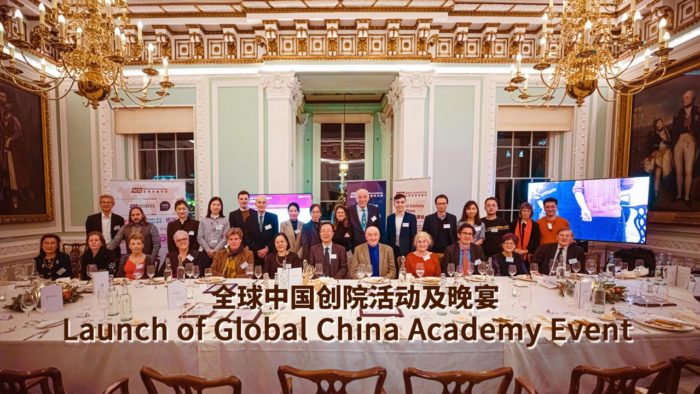
Launching Global China Academy (GCA)
There were two GCA launch sessions inserted in GCD VII: at the Opening session Professor Tony McEnery FAcSS made an announcement of founding of the Global China Academy and presented letters of thanks to retired Honorary Presidents Professor Martin Albrow FAcSS, Honorary President of Global China Academy, UK [in person] and Professor LI Qiang, Lifetime Professor and Former Dean of School of Social Sciences, Tsinghua University, China; Chinese Honorary President of Global China Academy; Chinese Chair of GCA Council and Founding Fellow. The ceremony of launching Global China Academy was held at Dinner.
Click HERE to watch both video.

Announcement of the GCD VIII theme: Governance for global health
Professor Tony McEnery: I had conversations about how actually things like climate change are very similar in terms of the challenges that it brings two issues like global health it’s an issue where no one country can solve the issue we need to work together in order to address some of these pressing issues.
Professor Nora Ann Colton: It could not be a more timely topic as we see the challenges of global health. As we just heard, you know health governance today has been very challenged over the last two years, as we witnessed the world really struggling with containing COVID-19 alongside exposing many weaknesses in our health systems and governance as well.
Click HERE to watch video.
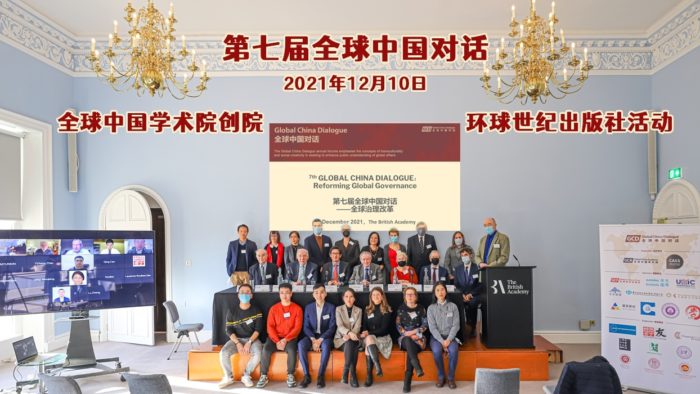
Highlights of the 7th Global China Dialogue events
We welcome you to this review of the 7th Global China Dialogue with the theme of Reforming Global Governance, and related activities. It was held at the British Academy on 10 December 10, 2021. The Dialogue consisted of four panels:
• Transformations: Society and Environment
• Digital Security and Geopolitics.
• Personal and Cultural Identities, State and Corporation
• Reforming the Institutions
The Dialogue was co-organised by the Global China Academy and the ESRC Centre for Corpus Approaches to Social Science at Lancaster University, and supported and sponsored by many universities and institutions at home and abroad.
Click HERE to watch video.
Click HERE for over 30 videos.
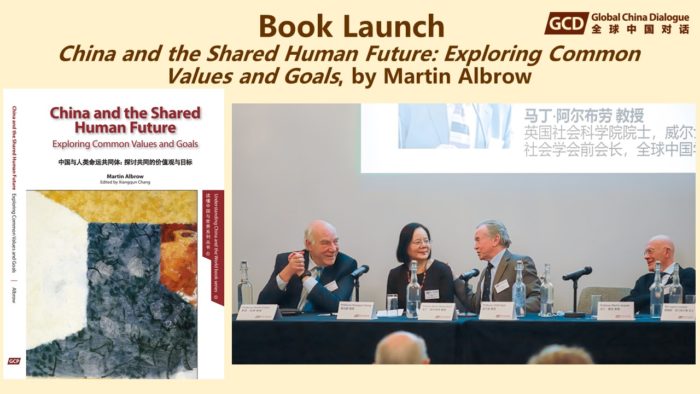
Launching a new book at GCD VII by Global Century Press
There were two GCP book launch sessions inserted in GCD VII: at the Closing the author – Professor Martin Albrow, editor – Professor Xiangqun Chang and reviewer – Professor Robin Cohen of Oxford University made short speeches. At the Reception Dr Boyi Li of the London school of Economics and Political Sciences (LSE) and Dr Yan Wu of Swansea University presented their book reviews.
Click HERE to watch videos.
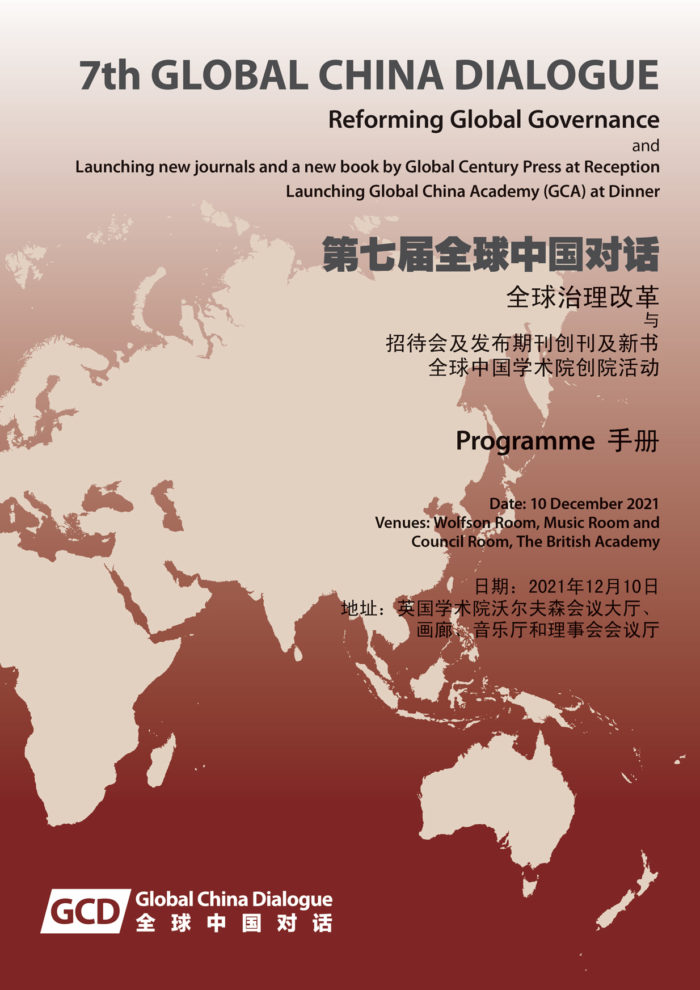
7th Global China Dialogue: Reforming Global Governance, 2021
The 7th Global China Dialogue (GCD VII), with the theme ‘Reforming Global Governance’, will be held on 10th December 2021. This is the planned culmination of a series that began in 2014 with the aim of bringing together scholars and practitioners from China and the rest of the world to exchange their insights into the
problems that challenge human existence on our planet today. Our aim is to yield proposals for the reform of global governance based on these insights.
We consider global governance in the broadest sense to cover the worldwide ordering of society to enable the peoples of the world to meet existential challenges, and to give the chance for human beings everywhere to lead fulfilling lives. China’s ‘community of a shared future for mankind’ also provided the world with a similar vision. Our panels of discussants from China and other countries will be invited to examine four areas of strategic significance for realizing these or, indeed, any visions for the governance of human society at this time of crisis.
Click HERE to download brochure.
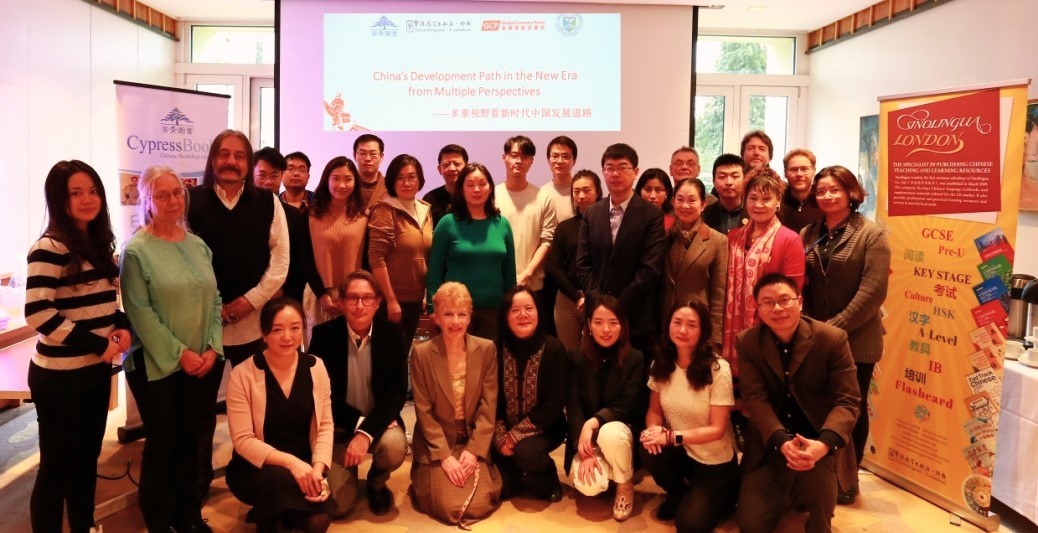
多重视野看新时代中国发展道路
“多重视野看新时代中国发展道路”主题研讨会于2020年1月14日在剑桥大学成功地举行。研讨会从外国学者和海外华人的视角出发,围绕《之江新语》等著作,深度解读新时代中国发展道路以及面临的机遇与挑战。来自中国、英国、法国等国家的专家学者、英国华人华侨代表、媒体代表近50人出席了此次活动。

本次活动由常青图书(英国)有限公司和华语教学出版社伦敦分社主办,环球世纪出版社和剑桥华人社区中心协办。

常青图书(英国)有限公司总经理谢晓宬先生、华语教学出版社伦敦分社总经理柴文静女士率先致欢迎辞,他们对各位嘉宾的到来表示欢迎,并结合各自的经历分享了对于新时代中国发展道路的理解,同时希望借助此次研讨会,使更多的读者加深对中国的了解与理解。

环球世纪出版社社长英格丽∙克兰菲尔德女士、剑桥中国中心主任李金朝女士也分别发表致辞。

三位主讲嘉宾分享了他们对专著的阅读体会和对中国问题研究心得。多年从事中国经济、外交政策研究的法国桥智库总裁周瑞博士认为这些著作提供了生动的新时代中国改革理论体系的编年史。

英国皇家艺术院院士,全球中国学术院院长常向群教授基于《之江新语》中英文版著作的语料库,以“语料库社科法”深入剖析了中国在省域层面对国家治理体系和治理能力的理论探索与实践创新。

玛丽女王大学孔子学院耿直博士从语言交流与构建人类命运共同体之间的关系的角度阐释了新时代中国道路的具体实践。

与会者与主讲嘉宾们在问答环节也进行了积极的互动 。

研讨会期间,“全球百佳华文书店联展—英国剑桥站”活动同步举行,期间展出了中国政治、经济、文化、教育、社会科学等方面的图书,受到广泛关注。

大家表示以后愿意继续参与这样的活动。
媒体报道
- China.org Symposium on China’s development path in the new era held
- China News Net 中华新闻网 “多重视野看新时代中国发展道路”主题研讨会在剑桥大学举行
- 华人头条 “多重视野看新时代中国发展道路”主题研讨会在剑桥大学举行
- 我在英伦深呼吸 多重视野看新时代中国发展道路”主题研讨会在剑桥大学举行
点击这里进入英文网页
点击这里进入英汉双语网页

